|
|
|
Sort Order |
|
|
|
Items / Page
|
|
|
|
|
|
|
| Srl | Item |
| 1 |
ID:
167640


|
|
|
|
|
| Summary/Abstract |
This article investigates whether the People’s Republic of China and Japan perceive each other as rivals in Latin America (LA; both the Chinese and Japanese governments tend to refer to the region as Latin America and the Caribbean (LAC), but for the purposes of this article we focus mainly on LA), and what impact such a perception might have on their foreign policy decision-making. We take LA as a case study because China’s and Japan’s recent (re-)engagement there began almost simultaneously in the early 2000s, and has developed against the background of domestic leadership transitions, growing demands for energy and markets, as well as international political agendas in which LA might play a key role. Developing the work of Thompson [(1995). Principal rivalries. Journal of Conflict Resolution, 39 (2), 195–223; (2001). Identifying rivals and rivalries in world politics. International Studies Quarterly, 45(4), 557–586] and Vasquez [(1993). The War Puzzle. Cambridge, MA: Cambridge University Press; (1996). Distinguishing rivals that go to war from those that do not: Aa quantitative comparative case study of the two paths to war. International Studies Quarterly, 40 (4), 531–558] on rivalry, in combination with perception theory [Jervis, R. (1976). Perception and misperception in international politics. Princeton, NJ: Princeton University Press], the article suggests three indicators by which to measure the extent to which China and Japan might perceive each other as rivals. Drawing on content analysis of a range of Chinese- and Japanese-language official writing, news reports, and academic analysis, the article argues that, despite some media representation of China and Japan as competitors for resources and power in LA, in fact mutual perceptions concerning rivalry have not affected LA policy decisions of these two countries.
|
|
|
|
|
|
|
|
|
|
|
|
|
|
|
|
| 2 |
ID:
112500
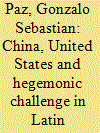

|
|
|
|
|
| Publication |
2012.
|
| Summary/Abstract |
Has China been a hegemonic challenge to the United States in Latin America in recent years? The article explores this question by setting a comparison with historical cases of instances of hegemonic challenge in Latin America, searching for similarities and differences, and looking for makers of rivalry as a way to start to distinguish perception from reality. I stress the instrumentality of framing issues, since they serve for internal mobilization and for control of allies. The article also attempts to illuminate the issue of how the United States has reacted to China's growing presence in an area historically considered within its sphere of interests, or "backyard," and about the dialogue between the United States and China about the region. It provides insights on the United States, China and Latin American countries' policy makers' thinking, collected through off-the- record interviews and closed-door debriefings.
|
|
|
|
|
|
|
|
|
|
|
|
|
|
|
|
| 3 |
ID:
149890
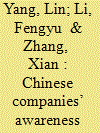

|
|
|
|
|
| Summary/Abstract |
China announced the launch of a national Emissions Trading Scheme (ETS) in 2017; however, companies appear show little enthusiasm for participation in the ETS in China. This paper identifies the factors affecting companies’ awareness and perceptions of ETS by conducting a national survey based on an online questionnaire from May to November 2015 in seven carbon trading pilots. The results indicate that companies’ attitudes towards the ETS are positively influenced by government regulations and policy, public relations management and estimated economic benefit. Of these, public relations management is the decisive factor and estimated economic benefit is confirmed to be a relatively weak predictor. A company's environmental and energy strategy exerts insignificant effects on its preference for the ETS, although the sampled companies are very willing to save energy and reduce emissions. There exists an inverted U-shape relationship between a company's level of mitigation technologies and its attitudes towards the ETS. The carbon price fails to stimulate companies to upgrade mitigation technologies. The majority of companies treat participation in the ETS only as a means of improving ties with governments, as well as of earning a good social reputation, rather than as a cost-effective mechanism to mitigate greenhouse gas emissions.
|
|
|
|
|
|
|
|
|
|
|
|
|
|
|
|
| 4 |
ID:
176831


|
|
|
|
|
| Summary/Abstract |
The decarbonisation of heating represents a transformative challenge for many countries. The UK's net-zero greenhouse gas emissions target requires the removal of fossil fuel combustion from heating in just three decades. A greater understanding of policy processes linked to system transformations is expected to be of value for understanding systemic change; how policy makers perceive policy issues can impact on policy change with knock-on effects for energy system change. This article builds on the literature considering policy maker perceptions and focuses on the issue of UK heat policy. Using qualitative analysis, we show that policy makers perceive heat decarbonisation as disruptive, technological pathways are seen as deeply uncertain and heat decarbonisation appears to offer policy makers little ‘up-side’. Perceptions are bounded by uncertainty, affected by concerns over negative impacts, influenced by external influences and relate to ideas of continuity. Further research and evidence on optimal heat decarbonisation and an adaptive approach to governance could support policy makers to deliver policy commensurate with heat decarbonisation. However even with reduced uncertainty and more flexible governance, the perceptions of disruption to consumers mean that transformative heat policy may remain unpopular for policy makers, potentially putting greenhouse mitigation targets at risk of being missed.
|
|
|
|
|
|
|
|
|
|
|
|
|
|
|
|
| 5 |
ID:
119979
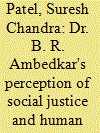

|
|
|
| 6 |
ID:
192987


|
|
|
|
|
| Summary/Abstract |
This article examines perceptions of China and contributes to the ongoing academic debate on Sinophobia in Central Asia. However, unlike existing studies, it specifically focuses on perceptions of those, who have first-hand China experience – Kazakh students/graduates of Chinese universities. Based on in-depth interviews with them, the article argues that those with first-hand China experience tend to reject the China threat theory, found to be widespread among the general population. Instead, China-educated Kazakh youth perceive China mostly as an economic opportunity for their own country. Yet, this does not necessarily make them Sinophiles in the sense that they still express certain concerns related to their country’s potential over-dependence on China. But more interestingly, they see China as the “civilizational other.” This perceived civilisational abyss even among the more-informed segments of the population appears to be one of the main causes of the alienation of China and the Chinese in Kazakhstan.
|
|
|
|
|
|
|
|
|
|
|
|
|
|
|
|
| 7 |
ID:
121836
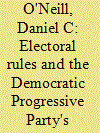

|
|
|
|
|
| Publication |
2013.
|
| Summary/Abstract |
The Democratic Progressive Party (DPP) in Taiwan increased its vote share in each legislative election from 2001 to 2008. Nevertheless, the 2004 and 2008 elections were widely viewed as major defeats for the party. Through an analysis of the DPP's performance in these elections, this article considers the effects of electoral rules on election outcomes and the perception of those outcomes. In Taiwan, under both the previous single non-transferable vote (SNTV) and the current mixed member majoritarian (MMM) systems, the mechanical effect of how electoral rules translate votes into seats and the psychological impact this has on voter and party behavior have influenced party electoral performance, and the perception of it, by causing vote and seat shares to diverge. In addition, this article analyzes whether recent redistricting in Taiwan structurally disadvantages the DPP.
|
|
|
|
|
|
|
|
|
|
|
|
|
|
|
|
| 8 |
ID:
162909
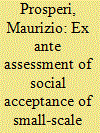

|
|
|
|
|
| Summary/Abstract |
Social acceptance is a relevant determinant of the development of agro-energy systems because its absence can cause delays or even the abandonment of innovative projects. This paper aims at an ex ante assessment of the socio-political acceptance of small-scale agro-energy systems in rural areas located in southern Italy, according to the bioenergy village approach. Starting from a theoretical model, we investigated the key factors influencing the perception of the risks and benefits of the realization of a biomass combustion plant, by a statistical survey on a sample of 152 members of the local community living in eight municipalities located in a rural area. Through exploratory and confirmatory statistical analyses, we identified two key factors: (a) the economic, environmental, and social benefits for the community and (b) reassurance from the energy company management. This research shows that it is very important to consider these elements in order to facilitate dialogue and the debate within the local community. In this way, the involved actors will be enabled to express their expectations to decision makers and policymakers, thus contributing to the steering of the project. In other words, community involvement and the democracy of the energy policy processes are favoured.
|
|
|
|
|
|
|
|
|
|
|
|
|
|
|
|
| 9 |
ID:
154725


|
|
|
|
|
| Summary/Abstract |
This article proposes an exploration of language as a cultural voice in the research of leadership, and
the conception that the dyadic relationship between leader and follower can be further looked into
semiotically within the discourses of language. In particular, this research hopes to bring into view the
plausible relationship between Chinese politeness and leader–follower interactions as well as its impact
on followers’ career development. The appropriate (non)usage of second-person pronoun nín (您) by
followers while interacting with superiors is the exemplar vernacular examined in this article. We
engaged 32 eMBA students on the usage of this second-person polite pronoun in official organisation
settings. Many agreed that Chinese politeness is both expected and required by interlocutors involved,
and it is a form of ‘face-giving’ and an acknowledgement of hierarchical differences. In most Chinese
organisations, status and hierarchical positions are specified clearly and must be properly acknowledged
as linguistic politeness is both expected and required. The authors hope to raise the possibility that the
linguistic and cultural influences, particularly politeness, involved in face-to-face verbal interactions
within formal Chinese corporate environment may signal a possible discursive variation in leader–follower
communication studies.
|
|
|
|
|
|
|
|
|
|
|
|
|
|
|
|
| 10 |
ID:
095015


|
|
|
|
|
| Publication |
2010.
|
| Summary/Abstract |
Corruption is important because it undermines bureaucratic predictability and is a potential threat to support for a political regime. The perception of corruption is the most commonly used measure of the actual incidence of corruption. This article marshals the New Russia Barometer survey data to challenge this assumption. Even though most Russians perceive a variety of everyday public services as corrupt, this assessment is not based on first-hand experience. Only a minority pays bribes. We test four hypotheses about differences in individual perception and experience of paying bribes: the ability to pay, contact with public services, normative acceptability and political awareness. Contact is most important for paying bribes whereas political awareness is most important for the perception of corruption. We also test how much the perception and experience of corruption, as against other forms of political and economic performance, affect support for the regime. Support is driven by the substantive performance of government, especially its management of the economy, rather than by the perception or experience of corruption.
|
|
|
|
|
|
|
|
|
|
|
|
|
|
|
|
| 11 |
ID:
122923
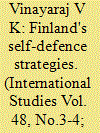

|
|
|
|
|
| Publication |
2011.
|
| Summary/Abstract |
The essay examines the threats and challenges that Finland has perceived first from imperial Russia, then from the Soviet Russia and now from the Russian Federation. Apart from studying the dynamics of Finland-Russia relations, it looks specifically at the Finnish responses for ensuring its sovereignty, independence and territorial integrity in general and the self-defence strategies adopted by Finland in dealing with potential threats from Russia in particular. This is done in the context of Paul Schroeder's categorization of self-defence strategies.
|
|
|
|
|
|
|
|
|
|
|
|
|
|
|
|
| 12 |
ID:
102757
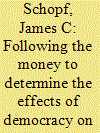

|
|
|
| 13 |
ID:
168996


|
|
|
|
|
| Summary/Abstract |
How does the subjective conceptual framing of conflict impact the warring parties’ attitudes towards political compromise and negotiation? To assess strategies for conflict resolution, researchers frequently try to determine the defining dispute of a given conflict. However, involved parties often view the conflict through fundamentally distinct lenses. Currently, researchers do not possess a clear theoretical or methodological way to conceptualize the complexity of such competing frames and their effects on conflict resolution. This article addresses this gap. Using the Israeli–Palestinian conflict as a case study, we run a series of focus groups and three surveys among Jewish citizens of Israel, Palestinian citizens of Israel (PCIs), and Palestinians in the West Bank. Results reveal that three conflict frames are prominent – material, nationalist, and religious. However, the parties to the conflict differ in their dominant interpretation of the conflict. Jewish Israelis mostly frame the conflict as nationalist, whereas Palestinians, in both the West Bank and Israel, frame it as religious. Moreover, these frames impact conflict attitudes: a religious frame was associated with significantly less willingness to compromise in potential diplomatic negotiations among both Jewish and Palestinian citizens of Israel. Interestingly, differing frames had no significant impact on the political attitudes of West Bank Palestinians, suggesting that the daily realities of conflict there may be creating more static, militant attitudes among that population. These results challenge the efficacy of material solutions to the conflict and demonstrate the micro-foundations underpinning civilians’ conflict attitudes and their implications for successful conflict resolution.
|
|
|
|
|
|
|
|
|
|
|
|
|
|
|
|
| 14 |
ID:
097029
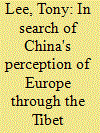

|
|
|
|
|
| Summary/Abstract |
China-Europe relations have intensified in recent decades, but there are still some awkward elements impeding the progress of bilateral relations.Tensions came to a headwith the international reaction to the suppression of protests in Tibet in March 2008, through which China's misperception of Europe appears to have deepened. In order to uncover the root cause of this misperception, the present article adopts a historical and psychological approach in analyzing China's views of Europe. The author argues that historical trauma and psychological causes are the main underlying reasons for the divergence between China and Europe.
|
|
|
|
|
|
|
|
|
|
|
|
|
|
|
|
| 15 |
ID:
084881
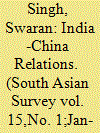

|
|
|
|
|
| Publication |
2008.
|
| Summary/Abstract |
Mutual perceptions and policies of an emerging India and a rising China have increasingly become the focus of public debates around the world. The two countries are seen today as ordained to become major pillars of the international system. The future of India-China relations clearly impinges on the future of Asia, if not the whole world. But in addition to bringing a limited visibility, this public glare has only further complicated their already complex web of problems and potential. The fact that both countries still continue to work together to enhance their mutual understanding holds promise for their future. While their historical baggage continues, continued engagement between China and India remains an imperative for their own survival and for the welfare of their people. In the context of the increasing external influences on their interactions, this article makes an appeal for indigenisation of their mutual explorations and policy formulations.
|
|
|
|
|
|
|
|
|
|
|
|
|
|
|
|
| 16 |
ID:
189249
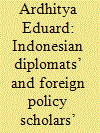

|
|
|
|
|
| Summary/Abstract |
The question of whether China’s rise to power will be peaceful cannot be evaluated without considering the actions of other major powers. Therefore, this study seeks to explore how Indonesia formulates its response to a rising China. Although previous studies have recognized the importance of perception in shaping Indonesia’s strategic response toward China, previous scholarship has not achieved a systematic investigation of Indonesians’ perception of a rising China. Therefore, this study applies image theory from international relations scholarship to carry out a qualitative content analysis of empirical data collected during interviews with Indonesian diplomats as well as foreign policy scholars. This study finds that perceiving China as presenting a degree of threat rather than opportunity is the dominant perceptual trend among individuals in this study sample. The relatively moderate degree of threats from China were characterized more as economic exploitation and political subordination, than as military attacks or occupation. However, these should be evaluated alongside findings that those individuals are more perceptually sophisticated in their approach to understanding China. This finding therefore suggests, that in the foreseeable future, Indonesian foreign affairs bureaucracy will hardly encourage Jakarta to notably shift Indonesia’s orientation toward the rising power.
|
|
|
|
|
|
|
|
|
|
|
|
|
|
|
|
| 17 |
ID:
099820
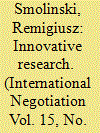

|
|
|
|
|
| Publication |
2010.
|
| Summary/Abstract |
An alternative method of capturing negotiating attitudes and behavior in international negotiation employs the concept of negotiating profiles and a way of measuring and mapping it. We apply this method in a survey of politicians and diplomats who participated in the EU enlargement negotiations. From the survey results, we selected and analyzed negotiating profiles of Malta, the Czech Republic, Poland, Estonia and Slovenia. The results of our analysis allow us to draw cautious conclusions concerning the most and the least favorable attitudes and behaviors in international negotiations on the highest levels.
|
|
|
|
|
|
|
|
|
|
|
|
|
|
|
|
| 18 |
ID:
121327


|
|
|
|
|
| Publication |
2013.
|
| Summary/Abstract |
This paper makes three contributions to the developing literature on public opinion and understanding of CCS. The first is a discussion of online focus groups as a deliberative method in experimental and perhaps consultative contexts. The second is the role of anchoring and associative reasoning in the development of public opinion of CCS, illustrated through the coincidental timing of the investigation with the Fukushima nuclear accident. The third is a discussion of managing public-facing energy messaging in an age of public access to online information. Two multi-day, online focus groups or "dialogue boards" were held, one in Poland and one in Spain, with participants drawn from regions with active CCS development potential. The nature of the groups led to participants being subject to wider social influence through discussion of the topic off-line. They were also able to research and present evidence on the topic to the group, deepening debate and allowing the emergence of 'experts'. The study illustrates and affirms the importance of trust in message source, the difficulties of challenging pre-existing concerns and opinion and the challenge potentially posed by access to conflicting online information.
|
|
|
|
|
|
|
|
|
|
|
|
|
|
|
|
| 19 |
ID:
156760


|
|
|
|
|
| Summary/Abstract |
This study investigates local expert perceptions of the role of environmental factors, especially in terms of contemporary climate change, in population movements from Bangladesh to India. The aim is to delve into locally held understandings of the phenomenon and to gain a better understanding of these migration processes, which are actively intertwined with local experiences. Both Indian and Bangladeshi experts were interviewed using semi-structured, in-depth interviews in order to explore insights from locally held perceptions and understandings of contextual factors. In total, 10 Bangladeshi and 15 Indian experts were interviewed, covering different disciplines, sectors, regions and job types, together providing a more complete and grounded picture of views of environmentally induced migration in Bangladesh and India. The results show that climate change is perceived by local experts as one of the key factors influencing migration in Bangladesh, both internally and externally. The interviewees, however, placed environmentally induced migration in a broader context of labour and economic migration. In particular, migration for environmental reasons in Bangladesh was evident long before the emergence of climate change as an issue. According to the interviewed experts, this does not preclude increased environmentally induced migration within and from Bangladesh in the future, but its analyses ought to be placed in historical and economical contexts.
|
|
|
|
|
|
|
|
|
|
|
|
|
|
|
|
| 20 |
ID:
165870
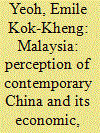

|
|
|
|
|
| Summary/Abstract |
This article looks at the Malaysian perception of the contemporary rise of China by focusing more on the country’s societal response rather than from a broad overall perspective of international strategic relations and diplomacy. The Malaysian society is seen as a complex multi-entity construct, constituted by often sharply differentiated fragments and sub-fragments which could exhibit vastly different responses to the implications of the rise of China. Within such a construct, perception of the rise of China and the appropriate Malaysian response are intricately entwined with domestic power politics, generational transition and governmental control over public discourse. Hence, the Malaysian perception of the contemporary rise of China is as complex as the Malaysian society itself, and what is revealed in official government policies and public discourses in the dominant mass media would fail to reflect the real depth of the issue if the intrinsic complexity of the Malaysian society is not taken into due consideration.
|
|
|
|
|
|
|
|
|
|
|
|
|
|
|
|
|
|
|
|
|